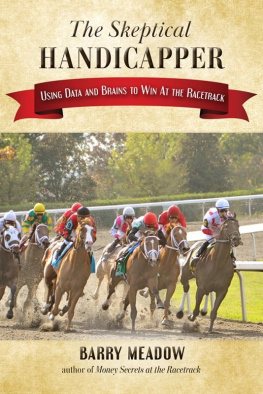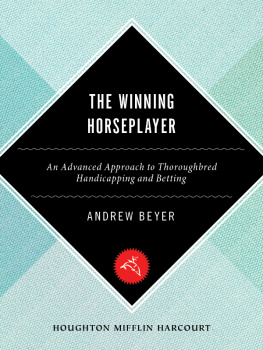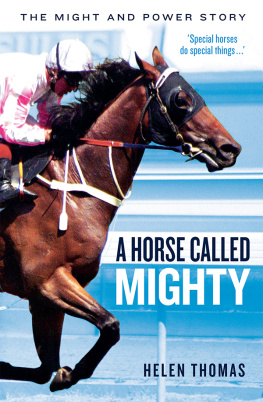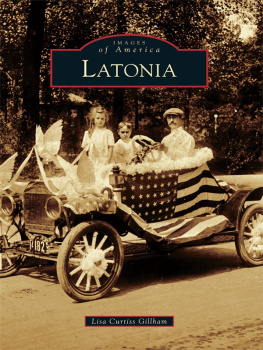Authors Note
Most of the studies in this book were provided by Ken Massa of Handicapping Technology and Research (htr.2.com), who uses the racing industrys source of past performances, Equibase. HTRs file downloads and subscriptions are available at Handicappers Data Warehouse (horsedata.com).
Ken was far more than just a computer programmer who could investigate topics for me. His vast research experience in thoroughbred handicapping made him a valued collaborator in this venture, and it made The Skeptical Handicapper more illuminating than it would have been without his help. We spent many hours figuring out which data was pertinent to the themes of this book, and how best to research and present the findings.
Thanks also to legendary racing author Andy Beyer, whose brilliant writing about handicapping and horseplayers inspired me often over the years, and who was generous enough to read a draft of this book and make valuable suggestions. Brad Free, the veteran handicapper at the Daily Racing Form, contributed important recommendations and corrections as well. Any errors in this book are strictly my own.
Here and there, some paragraphs in this book came from issues of Meadows Racing Monthly, or from articles Ive written for various racing publications.
Barry Meadow
Copyright 2019 by Barry Meadow
All rights reserved. No part of this book may be reproduced by any means without written permission from the publisher, except by a reviewer who wishes to quote brief excerpts in an internet or printed post.
Published by TR Publishing
Trpublishing.com
805 712-5060
ISBN 10 Digit for ebook: 0-945322-05-4
ISBN 13 Digit for ebook: 978-0-945322-05-4
Table of Contents
Foreword: We Are Horseplayers
We are horseplayers.
We are optimists-if our jockey falls off at the quarter, we actually think he might get back up and ride our horse to victory.
We are pessimistsas we nervously await the results of an inch-either-way photo, we know, deep down, that we are going to lose this photo.
We will drive two hours in the rain just to get to a simulcast center. And after a losing day, we will drive two more hours in the same rain to get home, where we will immediately open the Racing Form and spend two more hours working on the next day's card.
We will buck a 25% takeout to bet a superfecta at Monmouth or a pick 3 at Arlington Park, then complain that a hot dog costs $5.
We are bravewe will back our opinion with our own hard-earned cash, no matter that all available evidence clearly proves that our opinion is not very good.
We are cowardswe like a 17-1 shot and play him in so many positions, with so many combinations, that when he does win, we make 20 cents.
We will endure all manner of shutoutsa busy signal on our phone service, the Internet going down just as we were about to hit the "send" button, getting stuck on line behind a newbie who is confused about the cost of a trifecta box. And every time we are shut out, the horse we were going to bet wins.
We will badmouth the talking bozos on racing television shows, telling everyone within earshot that we could do a better job. And then write down the bozos' pick 4 selections.
We are generouswe will lend $50 to a racetrack degenerate knowing full well that Chase, Bank of America, and Citibank want nothing to do with this guy, and there is absolutely no chance that he will ever pay us back.
We are stingywe will not waste our money on admission to the clubhouse when the grandstand is $2 cheaper.
We want desperately to be on the inside. But when we meet someone who is on the inside, we're surprised to find they don't know any more than we do.
We will bet a horse because he is switching to a certain jockey. And when the horse loses, we will curse that same jockey.
We are patientwe will stand in a 15-minute line to make a $10 exacta bet.
We are hot-temperedwe will scream our lungs out at a television set.
We will have a story that will top everyone else's. The time our horse led by five with fifty yards to go but then ducked into the rail and ran into the infield. The race in which our 23-1 shot was on his way to an easy win when the jockey fell off. The day another horse bit our horse in deep stretch, causing him to slow down just enough to lose. No matter what bad-beat story a racing buddy has, we have a better one.
We know that we're far too intelligent to be tricked into buying one of those racing systems that promises automatic profits for no work, but hey, have you heard of this new one that sounds really, really good?
We're told that the Kentucky Derby is the most exciting two minutes in sports, but those two minutes are nothing compared with the two minutes it takes to run the sixth leg in a pick 6 where we're five-for-five.
We like horses enough that on a drive through farmland, we will stop our car and pet one. And when we have a bad day, we wish the whole damn breed would go extinct.
We will peruse the racing forums on the Internet, knowing that half the boasts of success are lies. But since we don't know which half, we read them anyway.
We are dreamerswe think we are going to make the one big score that will change our life.
We are realistswe know where the track's ATM is located.
We're not sure if we should quit if we're ahead for the day, or press up after a win to make some real money, or double our bet after a loss to get our money back. But we believe we're superior money managers.
We will ask a stranger who he likes in a race. If he agrees with our analysis, he's a genius. If he doesn't, he's just another racetrack idiot.
We will go seven-deep in a pick 4 only to have the 6-5 favorite win by a nose. Then we will go four-deep in the final leg, leaving out only the second choice that we don't care for, and guess who beats us?
We will mismark a ticket and not notice until the race begins. We meant to key the 3, but we accidentally keyed the 2 instead. Surprisethe 3 wins, the 2 loses, and the $2,000 we would have won now becomes a memory that will fade in, oh, forty years.
As the mathematically challenged racing commissioners raise takeouts even though business is plunging, we vow never to give some particular track our money again. Yet we do.
We whisper that the races are fixed. But we play anyway, because maybe the races are fixed for the horse we like.
We don't care if the racetrack is covered in filth and filled with lost souls who appear to have criminal backgrounds. We don't care if the food isn't fit for a feral cat. We don't care if the feature race is an $8,000 claimer. We don't care if the condescending track executives look down on us from the turf club, and look down on us in general. We still show up, with money.
Are we losers, because most of us are behind lifetime?
No, we are all winners.
Because we are horseplayers.
Introduction
A book on handicapping has been rattling around my brain for a long, long time.
I wrote Money Secrets at the Racetrack in 1988. It was a guide to managing your money at the track, but had no advice about handicapping. You do the handicapping; the book then showed you how to make the proper bets.
Oh, there was plenty of advice about handicapping around, and there had been for decades. Much of it was of the make-every-racetrack-your-private-bank variety. All you needed were a few simple rules, or, in later years, a decent computer program, and endless riches would soon be showered upon you.











